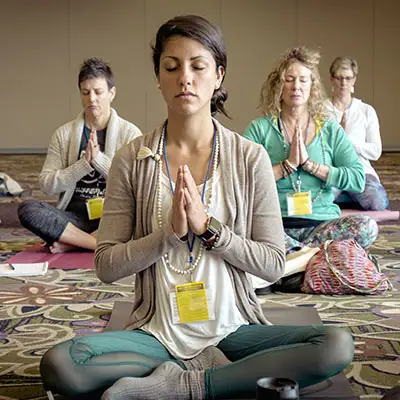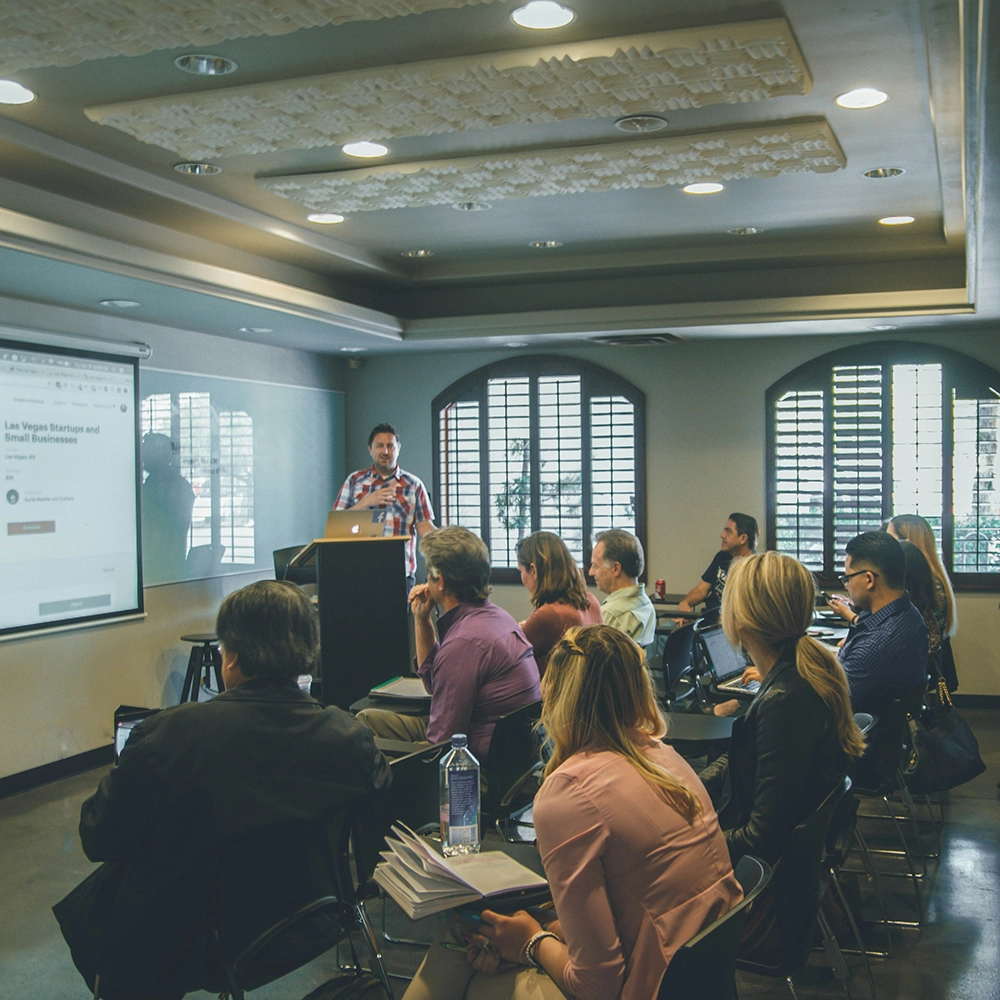Do you feel burned out from work? Do you catch yourself saying, “If I could just get away for a while …"? Is a change in order but you aren’t quite sure which new direction to take? Then a gap year might be for you.
Taking an adult gap year is more realistic than you might realize. Here’s everything you need to know, from how to use a gap year to build your resume to whether you can do a gap year if you have a family to how to pay for it. It’s time to plan your career break so you can come back refreshed and ready for your next steps in life.
Here’s what you’ll find below:
- What is a gap year?
- Can I take a gap year as an adult?
- Benefits of taking an adult gap year
- Is taking a career break bad for your resume?
- Adult gap year programs and ideas
- Do I need to take a year off work for an adult gap year?
- How much do I need to save for an adult gap year?
- How to plan an adult gap year on a budget
What Is a Gap Year?
Traditionally a semester or year between finishing high school and beginning college, a gap year is an opportunity for students to gain new experiences and broaden their understanding of themselves and the world in which they live.
Travel is often a key aspect of a gap year. Many people find it easier to step outside their comfort zone to try new things when they’re in a completely different location.
- There are fewer responsibilities distracting them from their personal and professional exploration.
- The pressure to adhere to others’ expectations of who you’re “supposed” to be doesn’t hold your development back.
- Being in a place full of unfamiliar people and customs can break down the mental barriers that sometimes keep us from examining something from a new perspective.
Can I Take a Gap Year as an Adult?
Absolutely! Adults in some fields have been taking gap years for ages; we just know them as sabbaticals. Regardless of your age or industry, though, an adult gap year can be the perfect solution to jump start a new career or get more out of the one you already have.
In some ways, taking a gap year can be more challenging as an adult than as a young person. You may have a family to consider, be afraid of jeopardizing an established career, or believe the myth that you’re “too old” to learn new tricks.
However, an adult gap year can be easier in other ways. You might have greater financial stability, making your time away more fiscally possible. If your children are older and on their own, you have more opportunity to enjoy a “golden gap year” (sometimes also called a silver gap year or, less appealingly, a grey gap year).
If you have a longer tenure with your company, they might be more likely to grant you the time off to take a sabbatical without having to quit your job completely. And, with more life experience under your belt, you could have a better idea of how you want to focus your sabbatical, resulting in greater personal benefit.
Speaking of benefits, why should you take an adult gap year? What’s in it for you?
Benefits of Taking an Adult Gap Year
An adult gap year offers many benefits, ranging from improving personal wellness to advancing your professional career.
- Tackle burnout. Sometimes it takes more than a two-week vacation to refresh and get unstuck.
- Recalibrate your goals and priorities.
- Learn something new, whether that’s a tangible career skill or a personal revelation.
- Pursue that passion or hobby you’ve been putting off.
- Give back better through voluntouring.
1. Tackle burnout.
The things that used to bring you joy no longer do. You’re filled with dread on Sunday nights. Your mood is often sour, your stomach is in a near-constant state of turmoil, and you’re using so much energy just to get through the day that you’re perpetually exhausted. You’re burned out.
Beating burnout goes well beyond a simple vacation. Real change is needed, or you risk going right back to the emotional, mental, and physical distress you experienced before.
“I think I've reached a point of burnout as I'm really unhappy in my role and have no motivation and feel really apathetic,” said a Reddit user who had been working for the same company for nearly two decades. “Normally I'm someone that goes out of there (sic) way to help, find improvement opportunities, drive change, etc., but over the past year or so I feel like I'm just checking the box and doing the bare minimum required which is not how I operate at all. I've tried taking long vacations, and by week 2 I feel re-energized and more back to normal, but then within 3 days back on the job, I go right back to feeling de-motivated and terrible."
The user ended by saying she was thinking about taking an adult gap year, but was it worth it? The responses were filled with encouragements like “hell yes” and “go for it!” Others shared their own success stories with a gap year, and how they couldn’t be happier with where they landed after taking even just a six-month career break.
Italian for a While, a company that organizes gap year experiences in Italy, points out that an adult gap year is “becoming a mainstream choice for adults seeking fulfillment, balance, and, in some cases, a total life reset” and that “it offers a refreshing alternative to the burnout culture many of us are trapped in.”
There’s no guarantee that a gap year will solve your burnout dilemma. But it could be the break in routine you need to catch your breath, re-examine your situation, and figure out what’s next.
2. Recalibrate your goals and priorities.
Maybe you aren’t burned out. Maybe you’re just ready for something different. An adult gap year can help you transition to a new career by allowing you to evaluate what you want professionally. Similarly, maybe you’re looking for something new on a personal level or deciding what life looks like after retirement.
The experiences you have during your gap year can help you refine your priorities and set goals. The space to breathe during your travels gives you time to plan the steps needed to set those goals in motion.
3. Learn something new.
Gap year travelers right out of high school develop life skills that you probably have a good grasp of already. For you, an adult gap year could be about learning a new skill for the career you already have, a new language for personal or professional use, or a new way to think about your beliefs or processes.
Travel has a sneaky way of shifting our perspectives if we let it. Consider how much stronger you’ll be as a person and as a colleague when you’ve taken the time for self-reflection, observation, and learning.
4. Pursue your passion.
If you feel like you’re always putting yourself second (or third or fourth) behind career and family, an adult gap year is your chance to pursue the passion or hobby you’ve been putting off. That bucket list? Time to start checking things off it.
It’s not uncommon for adults to reach a point in life where they question what their passions and hobbies even are. We spend a lot of time being “responsible,” taking care of others and doing what we think we’re supposed to. In the process, we lose sight of what we want.
If you fall in that category, lean into an adult gap year to test out new hobbies. You might find a passion for something that never crossed your mind until that moment.
5. Give back better.
Many traditional gap year travelers (AKA those in their teens) spend their time volunteering abroad. You can do the same, and you might even be in a better position to make an impact now that you’re older.
Think about the life skills you’ve built over the years. How can they make you a better voluntourist? Your time in the corporate world could make you the perfect person to work with women developing entrepreneurial skills in poor socioeconomic regions. The woodworking hobby you’ve had for the last 30 years could make you great at building schools. Your knowledge of the agricultural sector could allow you to lend a hand with reforestation or urban farming projects.
Is Taking a Career Break Bad for Your Resume?
The elephant in the room for many of us is whether taking an unpaid sabbatical or a career break is going to look bad on our resume. Especially in highly competitive industries, it’s a valid concern. Ultimately, only you can decide if it’s a risk you’re willing to take.
Planning your adult gap year well so that you have clear goals (compared to taking a really long, relaxing vacation) can help reduce your risk. We talk more about planning below.
It also helps to know how to talk about your experience when you return to the workforce.
- Practice explaining the reason for your adult gap year from a positive perspective. In other words, highlight the opportunities you sought from the experience rather than harping on your previous workplace’s toxic environment.
- Travels during your adult gap year might lead to great stories for a party. You should have different stories for an interview or cover letter, though. Think about the ones that are most relevant to your career and how you can best articulate them. Practice telling them in a low-stakes setting first.
- You’ve probably heard about transferrable skills, and there are many that translate between travel and the workplace. These include cross-cultural communication, conflict resolution, and risk mitigation. We talk about these and others in our blog about how to share travel experiences with employers. Check out our ideas, think about some others that might apply to your industry, and try out our interview tips while you’re at it.
It’s worth mentioning, before we move on to some ideas for how to spend your adult gap year, that you might find that you don’t want to return to your previous job or even the same industry you’ve been working in.
We know more than one person who, after returning from their adult gap year, chose to take a job with less responsibility and less pay. But this wasn’t a problem for them because the job was better aligned with what they wanted in life. In that case, having a resume gap may not be as detrimental as you think.
Adult Gap Year Programs and Ideas
Your trip should be uniquely personal. It’s all about your own discovery and growth, after all. To get you started though, we put together a short list of our favorite travel ideas and programs for an adult gap year.
- Train at a yoga retreat in Goa, India
- Get a wilderness EMT certification through an outdoor education program
- Enroll in foreign language classes
- Take an internship in computer coding in Dublin
- Get your hands dirty on a local farm through a work exchange program
- Start a memoir or finish your WIP (Work In Progress, for non-writers out there) at a residential writing retreat in Yorkshire, England
- Study photography or art in Venice, Italy
- Tackle wildlife conservation in Ecuador
- Practice organic farming in Costa Rica
- Study indigenous history in Peru
- Learn to scuba dive in Bali
- Conduct independent research that aligns with your field to demonstrate curiosity, critical thinking, and depth of expertise
- Volunteer abroad, either in a field similar to your professional industry or one that’s completely different
These ideas sound great, but do you have time?
Do I Need to Take a Year Off Work for a Gap Year?
Although it’s called a gap year, there’s no rule that says it has to be 365 days. Your sabbatical could last a few months or even a couple years, depending on your goals and how you plan to support yourself financially.
Remember that you might not have to be unemployed during your gap year. Some employers offer paid leave (more on that in a minute). If that’s the case, take full advantage of it to alleviate the financial stress of your gap year.
Other companies might offer unpaid leave. While less appealing because you won’t still be collecting a paycheck, it does mean that you’ll still have a job when you come back. That’s nothing to scoff at.
How Much Do I Need to Save for an Adult Gap Year?
People who have done an adult gap year say they spent anywhere from $5,000 to $40,000 per person on the experience. How much money you need to save before taking an adult gap year depends on several factors:
- Location: Some destinations are more expensive than others. Some of the cheapest gap years tend to be in Southeast Asia and could be accomplished with a budget of about $50 per day. If you’re planning on someplace like Italy, though, you’re going to need a bigger daily allowance.
- Timing: Similar to when you take a vacation, traveling during peak season will be more expensive than during off- or shoulder season. If your gap year plans include multiple smaller trips with periodic returns home, try to schedule those trips at less expensive times.
- Accommodations: Booking a vacation rental, staying at a hotel, or working for your room and board will all impact your budget differently. There are ways to save money on lodging without shacking up in a hostel with travelers half your age.
- Transportation: Think about the best way to get from one place to another during your gap year, especially if you plan to visit multiple destinations or choose one city as a hub for exploring outward regularly. Trains are often less expensive than planes. The cost of renting a car will vary more widely depending on where you are and the price of gas.
- Activities: If you sign up for a seminar or course, most of your activity expenses might be paid upfront as part of your training. But if you plan to explore more spontaneously, your expenses might be spread throughout the trip. Factor in how much you’re willing to spend for each activity, remembering that even if fees are small, they can add up over time.
- Essentials: Food, clothing, and housing are one kind of essential. Visas and vaccines are another. Most countries will have their own visa or eVisa processes and health requirements. Research what those are and how much they cost before you board a flight.
How to make money during a gap year
If your job doesn’t offer paid leave for a sabbatical or you find yourself short on cash during your gap year, try some of these ways to feed your bank account.
- Ask for a transfer. Multinational companies will have offices in other countries. Look into taking a position abroad, even if (maybe especially if) it means your role changes, too.
- Go the digital nomad route. With the expansion of remote work, it’s easier than ever to work from the road. It’s not the same as getting a career break, but the change of scenery and opportunities for exploration will be similar to taking a gap year.
- Try freelancing. Again, it’s not quite a break, but if your industry is conducive to freelancing, this can be a great way to make some extra cash while you travel. Freelance or consulting work could give you extra flexibility. Being in control of your own schedule can allow you to explore those growth opportunities.
- Pick up jobs on the road. This tip is even more relaxed than freelancing. Think about what you’re good at — not just professionally, but personally as well — and offer your services as you travel. You might be able to tutor English in Japan, housesit in the Alps, or work on an alpaca farm on the Argentine Altiplano. This type of alternative tourism probably won’t pay all your bills, but again, it offers some flexibility for your gap year endeavors while letting you earn a bit of extra spending money.
How to Plan an Adult Gap Year on a Budget
1. Investigate your employer’s sabbatical leave policy.
More companies are offering sabbaticals than in previous decades, but overall, the number is still relatively small. If your employer does offer leave for a gap year, dig into the logistical details. How long do you have to work there before you’re eligible? Will you still get a salary during your sabbatical or is it unpaid leave? What about benefits like health insurance?
It can be a difficult conversation with your boss if you don’t know how to ask your company for a career break. Come to the meeting with a solutions-oriented mindset and be prepared to negotiate different options.
If they aren’t on board for a paid sabbatical, ask about an extended, unpaid leave of absence with a guarantee that you’ll still have a job when you return. What could a remote work option look like? It might not give you the full break you hoped for, but if you’re worried about going unemployed, maybe that’s a good compromise for you. If you ask for a year off and they counter with six months, would you be comfortable accepting the new timeline?
2. Set goals for your gap year.
A sabbatical isn’t a vacation. Decide what you want to get out of your adult gap year. Do you want to learn a specific skill like computer coding or leadership that can help you grow your career? Do you want more of a restful break to pursue creative interests like painting or meditation practices?
It’s easy to think that a professionally focused sabbatical has to result in a new certificate or degree, but don’t discount the mental and emotional benefits a sabbatical can offer simply by giving your mind a chance to focus on something different.
Keep your goals top of mind as you plan your travel. They can impact where you go, whether you stay in one spot or visit multiple destinations, how much time you’re away, and of course what you do on a daily basis.
These goals will also help you frame the conversation you have with your current boss as you make a case for taking a gap year as well as with future employers when seeking a new job.
3. Decide if you’ll go solo or take a travel companion.
Sabbaticals can be done at home, but some of the most rewarding breaks come from exploring someplace new and different. If you’re traveling for your adult gap year, decide if you’ll be going solo, taking a friend or significant other, or bringing the entire family. All three can be done successfully.
The more people who come, the more planning it requires. Does the friend who’s coming with you need to work while you’re on sabbatical? Will you find a new school for the kids or home school them from the road? Many of these considerations are similar to if you were going to be a long-term digital nomad.
4. Create a budget and a timeline.
Once you know whether your employer will keep paying you, what you want to do during your gap year, and where you want to do it, you’ll be better able to figure out what your travel expenses will be.
Typical expenses include accommodations, transportation, food, activities, fees associated with programs or training you plan to pursue, visas and other travel documentation, and travel and health insurance, among others. We created a budget checklist for studying abroad. While not everything will apply to an adult gap year, it should help to get you started.
Also factor in any expenses you will still have at home. Do you have a mortgage or rent you’ll continue to pay? Will you hire a house sitter? Do you have to make arrangements to board or rehome a pet? Do you have debt you need to pay down?
Start plotting some key dates on your calendar, too. Most important is your departure date. It gives you a target to work toward and makes it more likely that you’ll actually take the gap year. Include deadlines such as when you need to renew your passport, get a visa, visit the doctor for regular health checks or for travel vaccines, and when your last day in the office will be.
5. Have a strategy for returning to work after a long career break.
You might have a clear idea of what will happen when you return home, especially if you’ll be going back to your old job. Or you might not have any preconceived notions of what’s next.
Either way, make a loose plan to soften the reverse culture shock at the end of your gap year. Some questions to get you started on your return plan include:
- If seeking new employment, will you start your job search during the last few months of your gap year or after you’re back home?
- Where will you live? Do you need to find a new house or apartment? Will it be in the same city/country as before your gap year or are you open to moving? Can you stay with friends or family until you get the details sorted?
- If you took a gap year for rest, what changes will you make to daily life to maintain healthy habits?
- If you incur any debt on your gap year travels, what is your strategy to pay it off? What about making changes to retirement savings and plans?
- Are there doctor’s appointments you need to schedule soon after your return? These are good habits to revisit if you haven’t seen your physician or dentist in a while.
Don’t Let Anything Get in the Way of Your Fresh Start.
Gap years can look very different from one person to the next, so your travel insurance, whether it’s an annual plan or single-trip coverage, should protect the trip you’re taking and not be a one-size-fits-all afterthought.
Contact our licensed insurance agents to find the best travel insurance for your adult gap year or get a quick quote online using our interactive guide. If you plan to travel abroad for more than a year, be sure to ask about Seven Corners Expat & Nomad Health Insurance.
Travel Like a Pro with The Wayfinder
Did you enjoy this blog? Get more articles like it before anyone else when you subscribe to our monthly newsletter, The Wayfinder.








